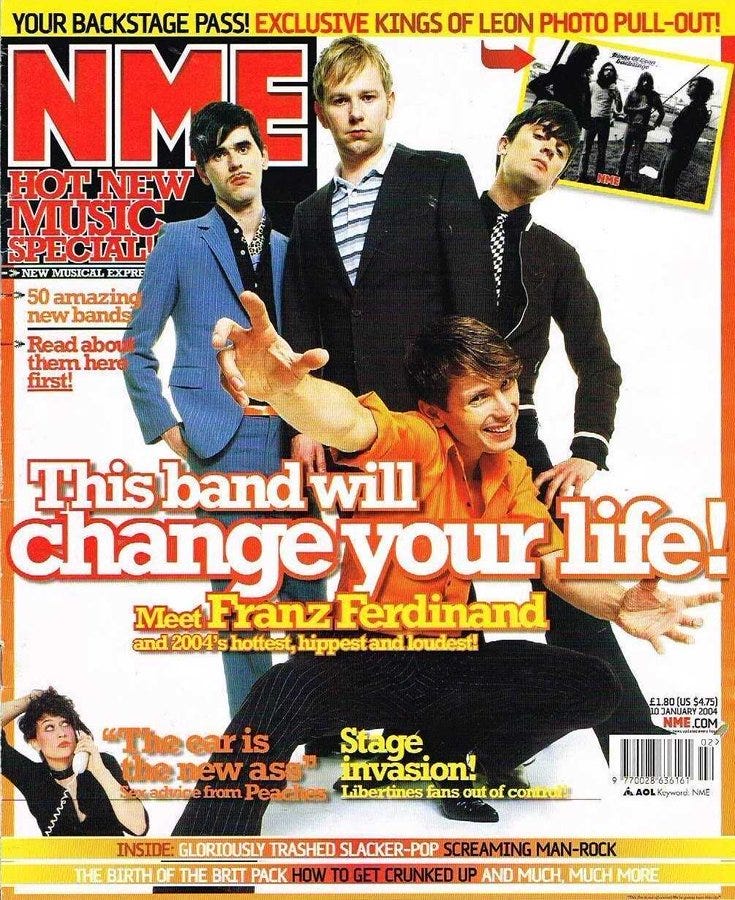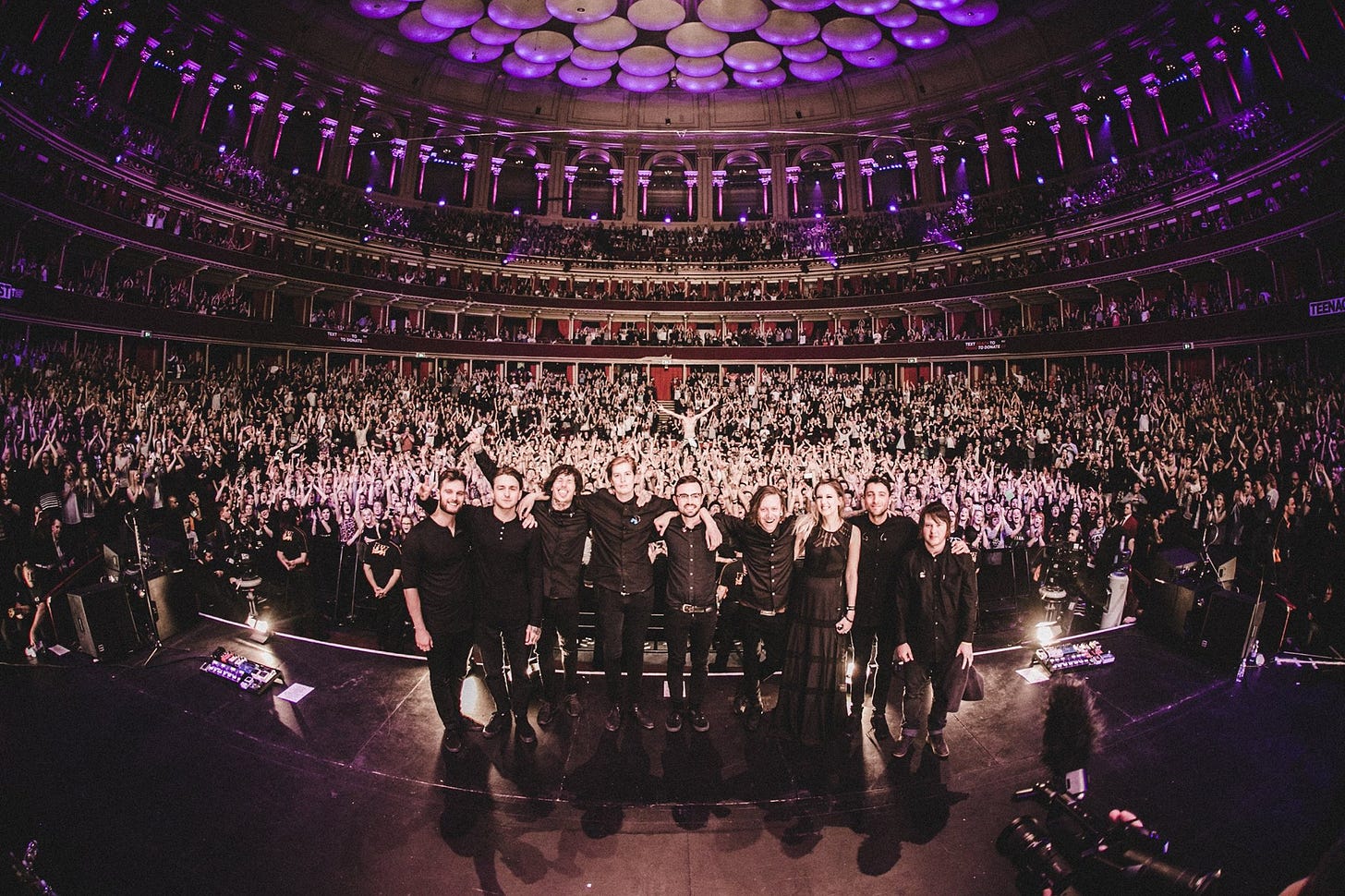'Build Them Up To Knock Them Down'
The British music scene in the 2000s was a strange place, where the music press played a pivotal role in the fortunes of several bands. NME, in particular, would 'Build Them Up To Knock Them Down'.
Several sub-plots operated concurrently throughout my manuscript. Central was the development of regional music scenes in Sheffield and Leeds that helped propel those bands that formed the New Yorkshire Wave. Another was the demise of NME Magazine and the role it had played in building up those bands, only to knock some of them down at a later stage when they deemed fit.
Build Them Up
One of the key functions of the music press will be to hype up bands. Typically, for their own ends when they find a band that fit with whatever they see as ‘trendy’. It’s somewhat inevitable if music journalists have their finger on the pulse of a local scene. These journalists can anticipate a band breaking through and want to be seen as discovering them.
Take the example of Arctic Monkeys. By the summer of 2004, indie music was back in fashion as The Strokes and the New Rock Revolution had demonstrated that guitars were cool again. Franz Ferdinand had already emerged as Glasgow’s worst-kept secret with live performances and a repertoire that encouraged attendees to dance. Dancing at an indie gig, honestly, it seemed revolutionary at the time.
There was the claim with NME Magazine’s cover on January 10th 2004 that “This band will change your life.” Two days later, the band released Take Me Out and a British guitar band had hit number three on the charts. It would have been pretty clear that the band would have charted highly at the time of print. Such hyperbolic claims were de rigueur.
By the summer of 2005, the focus had shifted to Yorkshire. Kaiser Chiefs were on the cover of NME on 6th August 2005. However, on page 6 was a live feature on Arctic Monkeys’ UK tour, with claims that their Birdwell Working Men’s Club gig was part of ‘Britain’s most in demand tour’.
The claim went that Arctic Monkeys were “What the world’s been waiting for.” At least, that’s according to the NME cover on 29th October 2005. It was a bold claim, yet the band had already gone number one with I Bet You Look Good on the Dancefloor. Something was happening and NME was keen to capitalise.

If bands were not coverstars, they could eagerly anticipate if they were awarded ‘Single of the week’ which could bring huge exposure to a band finding their way. Again, the magazine would help a band and could then claim to know which bands were going to make it by giving them the exposure they needed. It is also worth noting the PR campaigns instigated by record labels to ensure that certain bands got certain coverage at certain times. It’s a whole ecosystem at work.
Taking Credit
In the case of the New Yorkshire Wave, there’s even an argument that the magazine’s editor was keen to take credit for those bands ‘making it’. When the ‘Gangs of New Yorkshire’ photoshoot was created, various individuals criticised NME for deciding which bands to include, namely those that would give good press. The local record labels, Thee SPC in Sheffield, and Dance To The Radio in Leeeds, could have been helpful in pointing out other bands on the cusp. As could Sandman Magazine in Sheffield.
It was fairly obvious that the main hopes in Sheffield rested on Arctic Monkeys, Milburn, Bromheads Jacket, The Long Blondes, and Harrisons. Each of the latter four bands were included in the photoshoot. For Leeds, it was Kaiser Chiefs, The Cribs, Black Wire, ¡Forward Russia!. The Sunshine Underground, The Research, and The Ivories. In the case of the latter two, both had singles out yet The Research split in 2008 and The Ivories had split even earlier, in July 2006.
One of the quotes in the manuscript from Jan Webster, editor of Sandman Magazine, even suggested that NME believed that the New Yorkshire Wave was a reaction to the London scene.
‘I remember there was an interview with the editor at the time [Conor McNicholas] on the radio. He was asked what was going on in Sheffield, and he said it was a reaction to what was going on in London. It was this fascinating thing, “It's not you, you bellend”, it was a bunch of bands making good music, and they were young fans and interesting. “It's not about you, NME”’
As ever with the music press, the framing is key.
Criticism/Advice
One of the functions of the music press is to deliver hype and praise when necessary, typically in acts that they’re already invested in. Once acts have begun to disappoint after expectations have been raised, for instance with a ‘difficult second album’, you can expect some criticism. The difference is how that criticism is delivered.
Having spoken to local music journalists from the time, I realised that they performed the same job as the rest of the music press, they were just far more useful with it.

Shamir Masri worked for Raw Talent, offering local bands an outlet to be heard on BBC Radio. These bands would still be finding their feet and learning their trade, creating demo CDs and trying to find gigs to perform. Long before they became an arena band, Masri rejected the first demo from Bring Me The Horizon, calling it ‘not actually that palatable’. Years later, he interviewed them when the band had sold out the Royal Albert Hall for the Teenage Cancer Trust. Their lead singer, Oli Sykes, had remembered the rejection, taken on the criticism/advice, and submitted another demo CD which was then played that week.
Sandman Magazine would perform the same constructive duty. According to another BBC Radio presenter from the time, Iain Hodgson, ‘Whilst they [Sandman] supported the scene, they wouldn't pull punches as well if they didn't like something. There's something genuine in it, and there's a little bit of bravery around that as well. That you are prepared to give criticism and feedback to what's going on, but not in a way that's disingenuous and taking swipes trying to knock someone off a pedestal. You're doing it actually with a genuine intent of doing good, of improving what they're doing and improving what everyone's doing.'
Puerile Reviews
Compare that to the BBC Chart Blog, specifically one journalist; Fraser McAlpine. Towards the late-2000s, you could sense a real vitriol among music reviewers. They could smell blood and knew that the provincial guitar scene was running out of steam as nu-rave creeped in. This was why Jon Windle, lead-singer of Little Man Tate, would have panic attacks when the band released singles, it’s not hard to see why when you read the reviews.
This was McAlpine’s for the single, European Lover.
‘‘It's like a sleazy chat up:
Song: Hey hey, ladies!
Ladies: Oh, hi.
Song: What's your name, baby? I'm a musician.
Ladies: Err, right.
Song: No, seriously, I really am. I'm really indie.
Ladies: Sorry, we've really got to go, we all just collectively realised we left the gas on in every home in Britain- the explosion that might occur if we don't leave doesn't bear thinking about.
Song: What? Hey! They promised me this stuff would get me laid with a supermodel!
I don't want to come over like 'all indie is necessarily bad because it's indie,' cus that's not true. However, no music is good by virtue of its genre either, and the collective indie hope that if they just aim to sound like Oasis crossed with the Arctic Monkeys, they will somehow become musical genii and change the fate of the world forever (because DUDES, they've been known to drink A WHOLE LOT and that is what actually proves your musicianship, rather than whether your song is actually any good) are just the terrible posturings of people being exploited for a quick buck by a record company.'
Yes, that’s what passed for a single review back then. Not only is the reference to Arctic Monkeys present and correct, but the whole tone is cruel.
Unfair Comparisons
One of the more detrimental aspects of the New Yorkshire Wave was how every other Sheffield band was compared to the phenomenon that was Arctic Monkeys. Can you imagine being in Milburn, seeing the mates you supported go on to achieve extraordinary success only for the music press to unfairly compare you to them in pretty much every subsequent music review? It’s no wonder that the band refused to discuss Arctic Monkeys when NME interviewed them for a European tour.
Not only Milburn and Little Man Tate, both Bromheads Jacket and Harrisons would suffer the same treatment. Even though Tim Hampton of Bromheads Jacket could be seen to have inspired Alex Turner’s social commentary stylings. Each band was seen as riding on the coattails of Arctic Monkeys’ ground-breaking sound and social commentary, despite the chart toppers learning from those bands around them, as they all did.
Manufactured Spats
NME’s final tactic was to manufacture spats between bands, essentially creating their own headlines. One involved Little Man Tate and Reverend and The Makers, despite the bands knowing each other from having members working at The Boardwalk in Sheffield. Titbits would appear in NME each week, ‘LMT said this’, ‘Reverend said that’. While it generated interest in the bands, Jon Windle called it ‘embarrassing’, Jon McClure has since confirmed that everyone concerned has apologised.
Whether a band is hyped or not, their ultimate success depends on the quality of their music. In 2024, Little Man Tate and Milburn have reformed, Reverend and The Makers, Kaiser Chiefs, and The Cribs are still touring, and Arctic Monkeys are a stadium band. These bands still have their loyal fans, despite attempts to knock them down.



